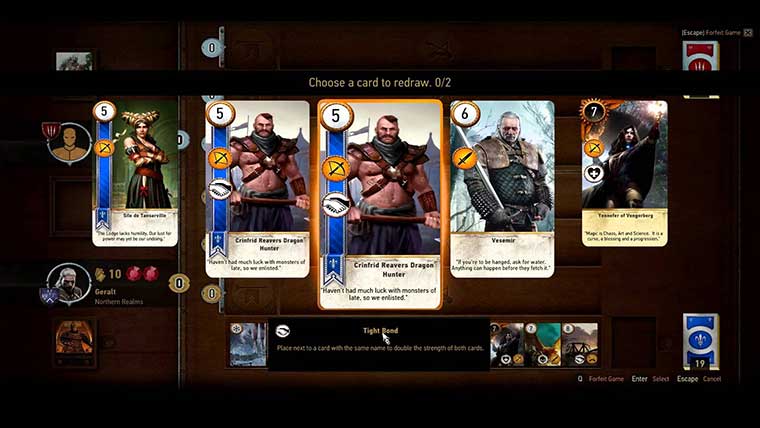

Finally, decks possess the following signature abilities. In each deck you will find a unique Leader Card, Unit Cards, Special Cards and Weather Cards. These include The Northern Realms, Nilfgaardian Empire, the Scoia’tael and Monsters. Gwent contains four possible types of decks. The first person to win two out of three rounds takes the match. A round concludes when both players no longer have cards or one person decides to pass on his or her turn and the other player has more points. You win a round of Gwent if you have more points than the other player. Units Cards contain different amounts of Strength points that comprise your overall total. Furthermore, you have the option to also play a Weather Card that may boost that Unit Card’s power. With the match underway, players put a Unit Card on the Gwent board in a combat row you play one card per turn unless the card you placed contains an ability that allows more than one. You then discard two cards you don’t want and redraw in the hope of receiving two superior cards. When a match begins, the game selects the starting player with a coin toss.įrom there, each person receives 10 random Gwent cards pulled from their decks.

The highest attack wins, so there's no reason to have a card with one attack when you can replace it with a card in the same class with a higher attack value. The higher the attack value on your cards, the better.Pay close attention to your opponent's faction so you know what passive ability he has and can defend against it.Have an even distribution of cards to cover every panel in case one panel gets knocked out.If your opponent wants to use most of his cards on the first turn, it means he has very little to work with afterwards. You need enough good cards to win the second turn. It's OK to lose the first turn because you have to win two turns to win a match. Don't play your entire hand on the first turn.Stop at every inn and tavern to play Gwent as much as possible and secure more powerful cards to improve your deck. In some cases you will only receive one chance to compete against someone. If someone challenges you to a match, accept immediately.Get rid of low-level cards to increase the odds of getting a great hand during a game. Ideally you want a relatively small amount of strong Neutral, Hero, Unit and Special cards in your deck.Fact is, you’ll need to do this ASAP if you intend to defeat the best Gwent players in The Witcher 3. Did you acquire a new and powerful card? Consider adding it to your deck immediately.Use weather cards that will impact your opponent, and do your best to toughen up rows containing your own cards that will not get affected by this Weather card.Avoid playing the strongest cards in the early goings of the match.Basically, don’t feel shame in doing this most of the time. Maybe the other player cannot beat your hand.

Maybe you passed because you prefer to save cards for later in the match (remember, you only have 10). It’s OK to pass your turn, since doing this doesn’t admit defeat.Many key characters in the game have their own Gwent cards. In some cases, you will only play against specific non-player characters one time, which makes understanding the general flow of the game extremely important since you cannot afford to lose. In addition, you will be able to take part in Gwent tournaments and regional competitions. Throughout your adventure, Geralt will meet a variety of innkeepers and merchants who play Gwent. Speaking to the scholar also presents Geralt with many Gwent side quests and opportunities to acquire different cards. This will begin the Gwent tutorial, and soon afterward, present an opportunity to play a match. Go inside the tavern and speak to the scholar. You’ll first play Gwent early on in White Orchard village. The game pits two armies against each other, with users playing different cards to gain an advantage over the other. Gwent is a collectible card game Geralt of Rivia (you) can play at key locations in The Witcher 3: Wild Hunt in between finishing Secondary Missions and Treasure Hunts.


 0 kommentar(er)
0 kommentar(er)
